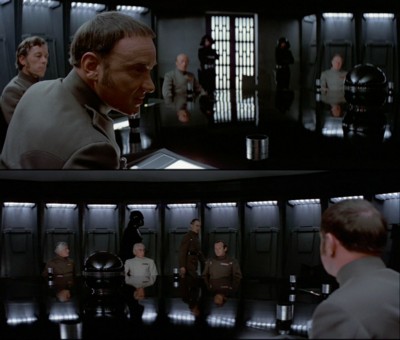Went to see V for Vendetta last night, which was good fun. I almost didn’t go, after reading a slagging of it by Peter Bradshaw in theguardian. Then I remembered that Bradshaw also gave Revenge of the Sith a preposterous one star and decided to ignore him – and I’m glad I did.
Some of V‘s core message – which is equally critical of authoritarian government and a population that allows it – is less than subtle, but it is well-timed.
There are some minor quibbles: the backstory isn’t well explained, leaving us watching the police investigate an apparently crucial mass murder we’ve been told little about; having John Hurt – who is typically good as the High Chancellor – also play an actor who is lampooning the High Chancellor is a recipe for audience confusion; and the Underground station used to illustrate mass Tube closures is Strand, which has been shut for donkeys years. Oh, and a very minor complaint: V’s Wurlitzer jukebox clearly doesn’t hold the 872 songs he claims – it looks like it takes around two to three hundred at most. I was concerned that V’s mask would make it hard for his personality to come across, but Hugo Weaving (previously Elrond in The Lord of the Rings and a drag queen in Priscilla, Queen of the Desert) does an excellent job of carrying the character in his voice.
Typically for Hollywood, while the villains are English, the actors playing the heroes are not: Weaving is Australian, Natalie Portman is American, and Stephen Rea, who plays the chief inspector (who, for unexplained reasons, appears to be part of the High Chancellor’s kitchen cabinet) is Irish, as is Sinéad Cusack, the only sympathetic one of V’s tormentors. Portman just about manages to pass herself off as English, although her accent, while not a Thurman or a Van Dyke, leaves a little to be desired; Rea seems to be playing his character as a Yorkshireman, but this accent comes and goes. Given that the dialogue states that his mother was Irish, perhaps he should’ve stuck with his natural voice.
It was great to see such a range of British acting talent though. Hurt’s number two is played by Tim Piggott-Smith (I didn’t recognise him at first), who is best known for The Jewel in the Crown, but was also in the Doctor Who story The Masque of Mandragora. Ben Miles from Coupling (with a really bad haircut), Rupert Graves (last seen as a far right MP in Spooks) and John Standing, whose many roles include in the Avengers episode School for Traitors.
Rea is good, and much better than in the last thing I saw him, an episode of 1970s Brian Clemens anthology series Thriller calling K is for Killing (Cusack appeared, incidentally, in the episode The Eyes Have It). The man of the match award, though, goes to Stephen Fry, whose performance as Gordon Dietrich was charismatic, nuanced and thoroughly winning.
The use of familiar London locations for the finale makes it all the more powerful. I must confess to a guilty enjoyment of the pyrotechnics when V attacks establishment landmarks – I’ll put it down to an appreciation of the spectacular effects.
It’s not a great film, and I’m not familiar with the comic so I can’t comment on the truthfulness of the adaptation, but it is enjoyable and effectively directed with no major flaws. Its message, that handing power to governments in response to fear is not a good idea, is summed up in V’s motto:
People should not be afraid of their governments, governments should be afraid of their people.
Those in favour of ID cards and authoritarian terror laws would do well to see it.



Recent comments